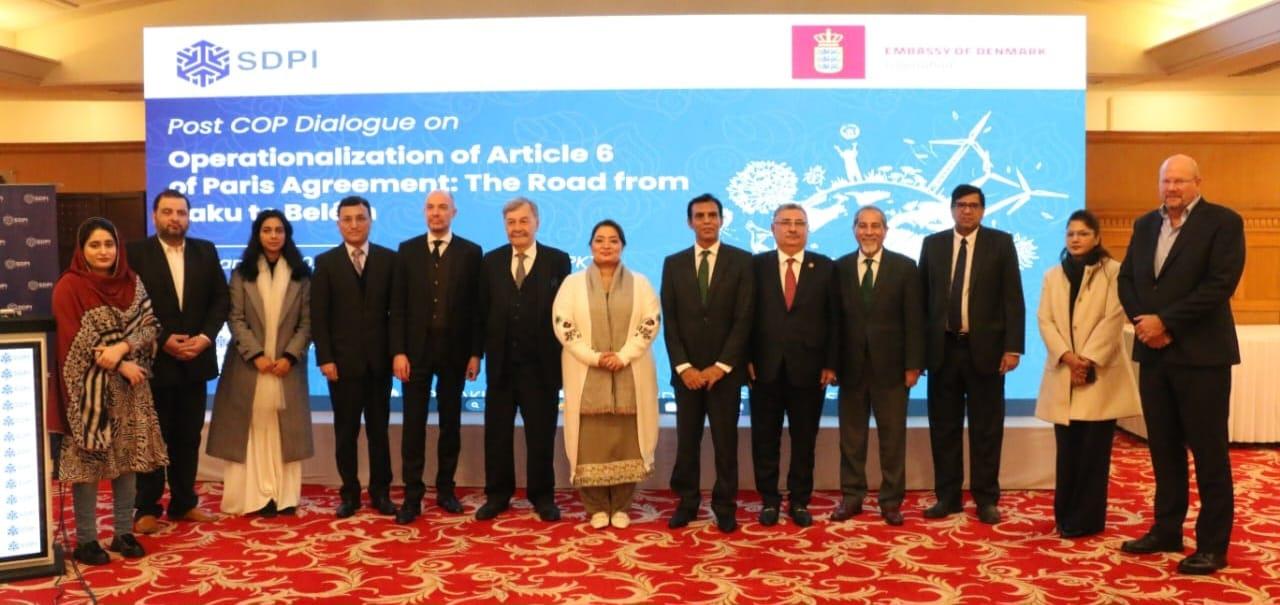
Pakistan Sets Sights On Regional Carbon Market Leadership
she stated during a seminar in Islamabad, organized by the Sustainable Development Policy Institute (SDPI), in collaboration with the Embassy of Denmark, that also hosted the policy dialogue titled“Post COP Dialogue Operationalization of Article 6 of Paris Agreement: The Road from Baku to Belem”.
Alam emphasized Pakistan's readiness to adopt international carbon trading guidelines.
She admired Pakistan's efforts during COP29 in Azerbaijan, which led to significant recognition and acknowledgment on global platforms. She added“Pakistan stands at the cusp of leading the region in carbon trading,” Pakistan unveils Carbon Market Policy at COP29, Baku” 16th November, Ministry of Climate Change and Environmental Coordination (MoCC&EC) marked 16 November as Pakistan Pavilion's“Carbon Market Day” and organized an event on Pakistan's carbon market.
Also Read: Essential Supplies Convoy Dispatched to Kurram After Nearly Three-Month Delay
Alam highlighted the country's practical approach to aligning with international frameworks. Despite challenges like capacity constraints and regulatory shortcomings, she underlined the unique opportunities in forestry, renewable energy, and other sectors.
We are collaborating with provinces and legislative assemblies to operationalize Article 6 and integrate grassroots participation in carbon trading initiatives,” Alam explained. She said the government is working on policy rules and soon a comprehensive policy will be shared, she explained, that we received policy guidelines from all the provinces, and the MoCC is closely working with provinces' relevant departments and supporting relevant departments while addressing the carbon market.
Alam called for South-South Cooperation to ensure no nation is left behind in achieving carbon neutrality. We welcome engagement from all stakeholders, including international partners, provincial governments, and private entities, to shape Article 6 operationalization,” she noted.
The Danish Ambassador Jakob Linulf, emphasizes the collaborative role of Denmark and SDPI in creating an appropriate environment for climate action.“Denmark is proud to work closely to help Pakistan attract foreign investments in addressing climate change,” he said.
The ambassador explained the efforts to mitigate climate change impacts and global warming would only succeed if the government of Pakistan secured a conducive environment for climate action.
He added that Denmark and Pakistan are supporting each other in making their societies more resilient. However, the framework under which both governments cooperate is guided by meetings held at the conference of the parties (COPs) and forums under the umbrella of the United Nations.
The next climate regime would be based on trading on carbon emissions reduction enabling funding for climate adaptation, he said, adding that climate change mitigation will rely on the internal climate action efforts to which every individual will contribute. Climate action starts with yourself as each one has to take steps like avoiding open garbage dumping, ensuring tree plantation, selecting eco-friendly consumption practices and power solutions, energy-efficient buildings for less power consumption, and securing a long-term environment for foreign direct investment through carbon emissions trading.
Dr. Abid Qaiyum Suleri, SDPI Executive Director, highlighted the need for transparency and robust monitoring in carbon markets.“We must establish independent accreditation bodies and align with international frameworks like the Carbon Border Adjustment Mechanism (CBAM),” he stated.
Suleri, highlighted key challenges in carbon trading, emphasizing the need for transparency and the establishment of a global carbon credit registry. He stressed the importance of implementing Articles 6.2, 6.4, and 6.8 of the Paris Agreement, which requires corresponding adjustments for host countries.
Zulfiqar Younas of the Ministry of Climate Change (MoCC) announced the launch of a customized carbon registry by February, marking a key milestone in operationalizing Article 6. The registry aims to facilitate transparent carbon credit trading, enabling Pakistan to tap into international carbon finance markets.
Speakers at the dialogue highlighted Pakistan's progress in leveraging COP29 outcomes. The €20 million SPAR6C initiative, funded by the German government, is preparing Pakistan and other countries to implement Article 6 through project development in green energy, transport, forestry, and waste management, said Ahsan Karman, a senior consultant and member of Climate Change Authority. He also announced the preparation of 13 project ideas in collaboration with provincial governments.
Andrew Bailey Managing director, BASF and representative of OICCI reiterated the chamber's commitment to supporting Pakistan's climate action goals. The private sector remains a critical partner in achieving carbon neutrality.

Legal Disclaimer:
MENAFN provides the information “as is” without warranty of any kind. We do not accept any responsibility or liability for the accuracy, content, images, videos, licenses, completeness, legality, or reliability of the information contained in this article. If you have any complaints or copyright issues related to this article, kindly contact the provider above.






















Comments
No comment